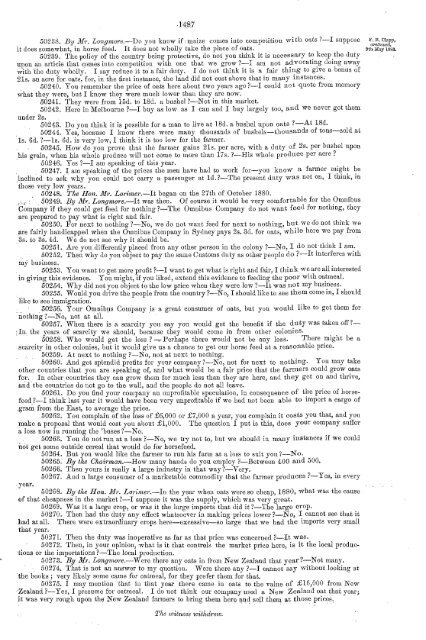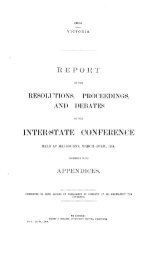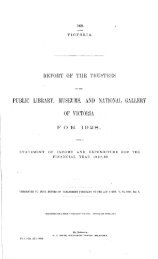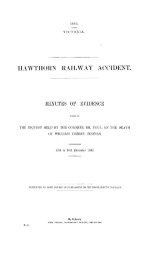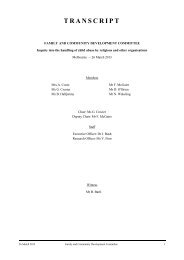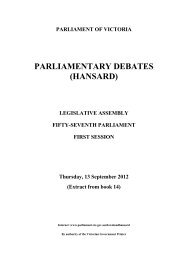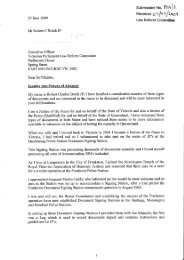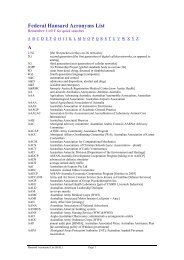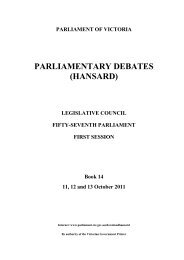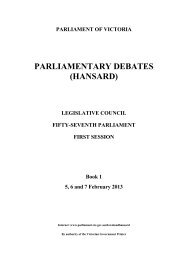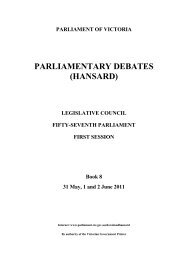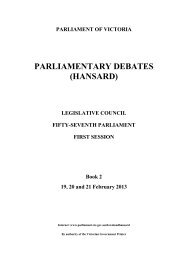Minutes of Evidence p.1401-1509 - Parliament of Victoria
Minutes of Evidence p.1401-1509 - Parliament of Victoria
Minutes of Evidence p.1401-1509 - Parliament of Victoria
Create successful ePaper yourself
Turn your PDF publications into a flip-book with our unique Google optimized e-Paper software.
-14:8:7<br />
50238. By 11£1·. Longmore.~Do you know ifnnaize comes into competition with oats ?-I suppose<br />
it does somewhat, in horse feed. It does not wholly take the place <strong>of</strong> oats.<br />
50239. The policy <strong>of</strong> the country being protective, do not you think it is necessary t~ keep.the duty<br />
upon an article that comes into competition with one that we grow ?-I u.m not advocatmg domg away<br />
with 'the duty wholly. I say reduce it to a fair duty. I do not think it is a fai~· thir:g to give a bonus <strong>of</strong><br />
2ls. an acre for oats, for, in the first instance, the land did not cost above that in many 111stances .<br />
.· 50240. You remember the price <strong>of</strong> oats here about two years ngo ?-I could not quote from memory<br />
what they were, but I know they were mucblower than they are now.<br />
50241. They we1·e from Hid. to 18cl. a bushel ?-Not in this market.<br />
50242. Here in Melbourne ?-I buy as low as I can and I buy largely too, and we never got them<br />
under 2s.<br />
50243. Do you think it is possible for 9, man to live at l8c1. a bushel upon oats ?-At 18d.<br />
, 50244. Yes, because I know there were many thousands <strong>of</strong> bushels-thousands <strong>of</strong> tons-sold at<br />
Is. Gel. ?-ls. 6d. is very low, I think it is too low for the farmer.<br />
. .. 50245. How do you prove that the farmer gains 2ls. per acre, with a duty <strong>of</strong> 2s. per bushel upon<br />
his grain, when his whole produce will11ot come to more than 17s. ?-His whole produce per acre?<br />
502,16. Yes ?-I urn speaking <strong>of</strong> this year.<br />
. 50247. I am speaking <strong>of</strong> the prices the men have had to work for-you know a farmer might be<br />
Jnclined to ask why you could not carry a passenger at lcl. ?-The present duty was not on, I think, in<br />
those very low years.<br />
50248. The Hon. M1·. Lor·imer.-lt began on the 27th <strong>of</strong> October 1880.<br />
, ., . . 50249. By Mr. Longmore.-lt was then. Of course it would be very comfortable for the Omnibus<br />
Company if they could get feed for nothing ?-T4e Omnibus Company do not want feed for nothing, they<br />
are prepared to pay what is right and fair. . ·<br />
· 50250. For next to nothing ?-No, we do not want feed for next to nothing, but we do not think we<br />
are fairly handicapped when the Omnibus Company in Sydney pays 2s. 3d. for oats, while here we pay from<br />
. 3s. to 3s. 4d. We do not see why it should be. -<br />
50251. Are yon,differently placed from any other person in the colony ?-No, I do not ·think I am.<br />
· 50252. Then why do you object to pay the same Customs duty as other people do ?-It interferes with<br />
mv business.<br />
" 50253. You want to get more pr<strong>of</strong>it ?-I want to get what is right ancl fair,- I think we are all interestecl<br />
in giving this evidence. You might, if you liked, extend this evidence to feeding the poor with oatmeal.<br />
50254. Why did not you object to the low price when 1hey were low ?-It was not my busi;tess.<br />
. . 50255. Would you ch·ive the people from the country ?-No, I should like to see them come m, I should<br />
like to see immigration. .<br />
. . .'50256. Y om Omnib11s Company is a great consumer <strong>of</strong> oats, but you would like to get them for<br />
nothing ?-No, not at all.<br />
50257. When there is a scarcity you say you would get the benefit if the duty was taken <strong>of</strong>f?<br />
; In. the years <strong>of</strong> scarcity we should, because they would come in from other colonies.<br />
50258. Who would get the loss ? -,.Perhaps there would not be any loss. There might be a<br />
scarcity in other colonies, but it would give us a chance to get our horse feed at a reasonable price.<br />
50259. At next to nothing ?-No, not at next to nothing.<br />
50260. And get splendid pr<strong>of</strong>its for your company ?-No, not for next to nothing. You may take<br />
other countries that you are speaking <strong>of</strong>, and what would be ~fair price that the farmers could grow oats<br />
for. In other countries they can grow them for much less than they aJ;e here, and they on and thrive,<br />
and the countries do not go to the wall, and the people do not all leave.<br />
50261. Do you find your company an unpr<strong>of</strong>itable speculation, in consequence <strong>of</strong> the price <strong>of</strong> horsefeed_?-!<br />
think last year it would have been very tmpr<strong>of</strong>itable if we had not been able to import a cargo <strong>of</strong><br />
.gram from the East, to average the price.<br />
50262. You complain <strong>of</strong> the loss <strong>of</strong> £6,000 or £7,000 a year, you complain it costs you that, and you<br />
make a proposal that would cost you about £1,000. The question I put is this, does your company suffer<br />
a loss now in running the 'buses ?-No.<br />
_ . 50263. You do notrun at a loss ?-No, we try not to, but we should in many instances if we could<br />
not get some outside cereal that would do for horsefeecl.<br />
50264. But you would like the farmer to run his farm at a loss to suit you ?-No.<br />
50265. B;lj the Chairman.-How many hands do you employ ?-Between 400 and 500.<br />
50266. Then yours is really a large industry in that way?-Very.<br />
50267·. And a large consumer <strong>of</strong> a marketable commodity that the farmer produces ?-Yes, in every<br />
.year.<br />
50268. By tlte Hon. jJfr. Lm·imer.-In the year when oats were so cheap, 1880, what was the cause<br />
<strong>of</strong> that cheapness in the market ?-I suppose it was the supply, which was very great.<br />
50269. Was it a large crop, or was it the lmge imports that did it?-The large crop.<br />
50270. Then had the duty any effect whatsoever in making prices lower?-No, I cannot see that it<br />
had at all. There were extmord.inary crops here-excessive-so large that we had the imports very small<br />
that year.<br />
50271. Then the duty was inoperative as far as that price was concerned ?-It was.<br />
50272. Then, in your opinion, what is it that controls the market price here, is it the local produc<br />
·tions or the importations ?-The local production.<br />
50273. By Mr. Longmore.-Were there any oats in from New Zealand that year?-Not many.<br />
50274. That is not an answer to my question. Were there anv ?-I cannot say w-ithout looking at<br />
the books ; very likely some came for oatmeal, for they prefer them fo~ that.<br />
· 50275. I may mention that in that year there came in oats to the value <strong>of</strong> £16,000 from New<br />
''Zealand ?-Yes, I presume for oatmeal. I do not think our company used a New Zealand oat that year;<br />
it was very rough upon the New Zea,land brmers to bring them here ~nd sell them at those prices,<br />
'l'he witness withdre~~;.<br />
F. B. C!.~pp,<br />
continued,<br />
9tlllL~y 1883.


